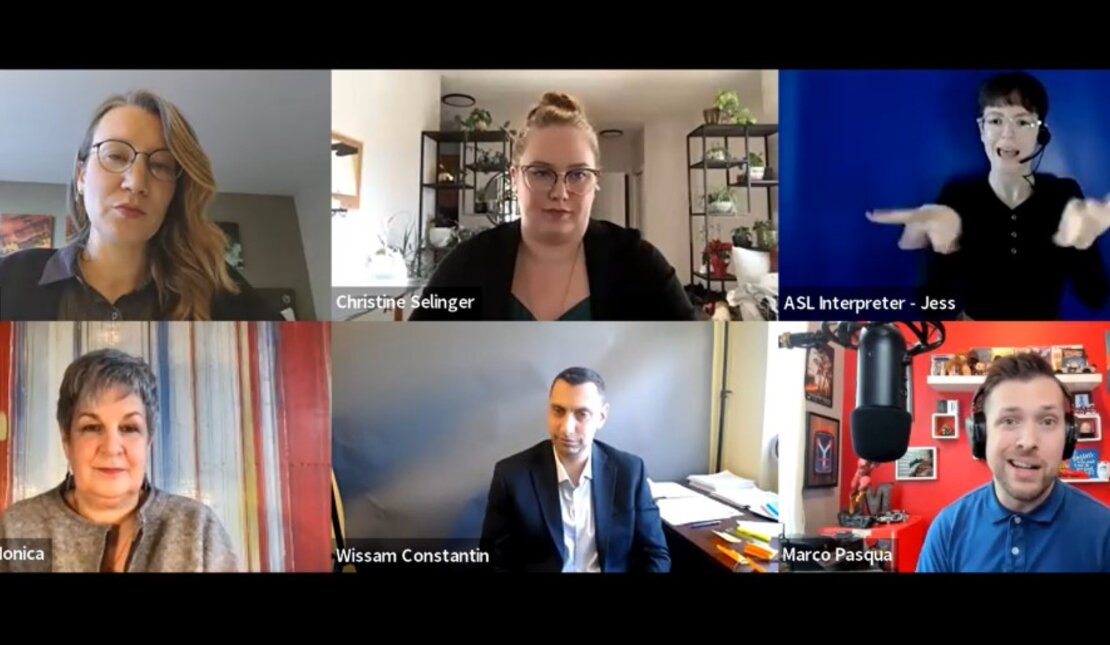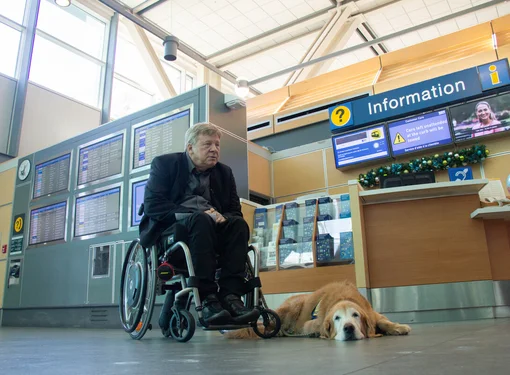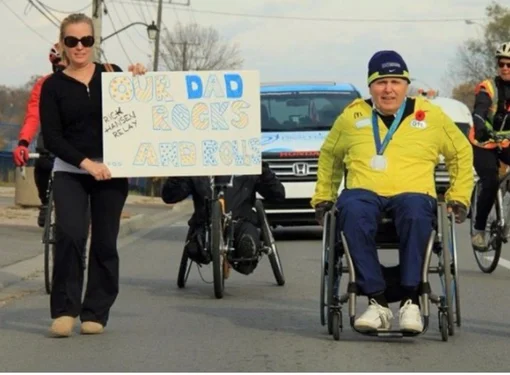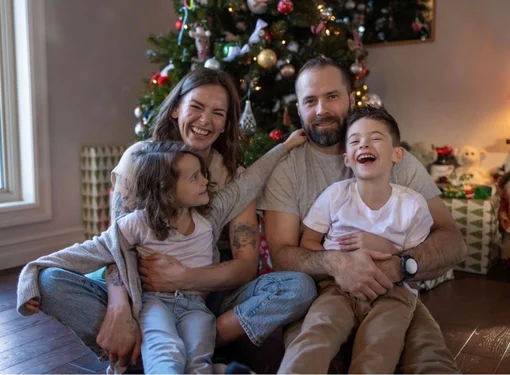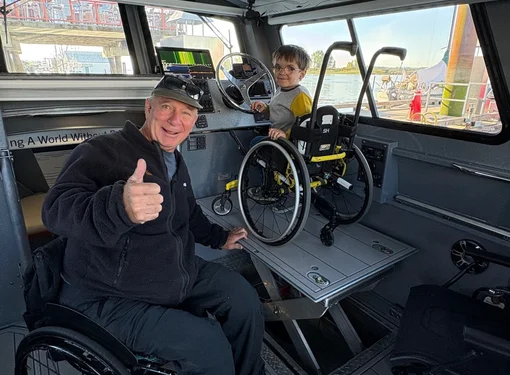The Power of Inclusive Language – A Recap
Le français suit l'anglais
The words we use carry meaning and power.
This was the theme of our live discussion, The Power of Inclusive Language, held for International Day of Persons with Disabilities on Dec. 3, 2021. The panel of accessibility and inclusion experts from across Canada offered plenty of food for thought during the hour-long conversation that was moderated by disability advocate Marco Pasqua.
If you missed the event or want to share it with colleagues, family, or friends, you can watch the recording here.
The conversation featured the following line-up of panelists:
- Christine Selinger, Instructional Designer with Canadian Blood Services, Director of Education and Events for the Abilities Expo and an independent consultant advising on accessible event solutions
- Meghan Kelley, National Manager, Business Solutions, Canadian Council on Rehabilitation and Work
- Monica Ackermann, Director, Enterprise Accessibility, Scotiabank
- Wissam Constantin, President, Canadian Association of the Deaf
There are so many points of discussion around the topic of inclusive language. While this post is a recap of the event, we will email registrants answers to the top-three questions from the Q&A period that time did not allow for addressing.
Panelists all agreed that inclusive language comes down to being mindful. When we do our best to communicate thoughtfully, and with intention, we are promoting equity and advancing social progress for people with disabilities. Panelists also agreed inclusive language is not about simply using a list of ‘correct’ words.
“A list of words doesn’t change anything; attitude is what will make a difference,” said Constantin. “A person can say all the right words and still not have the right approach, the right tone, or the right attitude.”
The following questions sparked a thoughtful and engaging conversation:
What does disability-inclusive language mean to you?
For Ackermann, disability-inclusive language acknowledges that disability is about an individual’s lived experience thus should be treated accordingly. It is also not about depicting people with disabilities as heroes to be admired or victims to be pitied.
“For me, disability-inclusive language is really about putting the person first; it’s being human-centered, and acknowledging that disability is an individual’s lived experience and an integral part of a person with the identity,” Ackermann said. “Inclusive language really goes beyond the phrase used to describe a disability. Does the language perpetuate bias and stereotypes? Does it celebrate both the uniqueness and everydayness of the human experience? These, to me, are some of the inclusion decisions that we are empowered to make each and every day.”
Kelley added that inclusive language is ever-evolving, is nuanced, and reflects personal preference.
“Language evolves over time, and the context and understanding of it that we have today will change as we learn as we grow,” she said. “Respect the others around us and the choice in terms of language they choose when it comes to identity.”
This also includes understanding the preference for person-first language, which puts an individual before their diagnosis, or identity-first language, which is language that leads with a person’s disability, noted Selinger.
“I identify as a disabled person, specifically putting disabled first as I am a wheelchair user. To me, inclusive language across the board is both thoughtful and deliberate,” she said. “I know language is difficult to change. Things will come out of your mouth before you realize what you’ve said – I’m definitely guilty of that! We’re not here today to tell you that what you’re doing is wrong or that you’re a bad person if you use certain language. We’re here to provide awareness of the impacts of language.”
What are some inclusive communication considerations from a pan-disability lens?
It’s essential to consider the whole population when considering inclusive language, said Selinger.
“When we’re thinking about language and disability, we need to think beyond mobility aids and beyond people who use wheelchairs. Disabilities aren’t segmented, so when thinking about one disability, you can’t just exclude others.”
Communication methods have changed during the last 18 months, pointed out Kelley. Health restrictions brought on by the COVID-19 pandemic have resulted in virtual meetings being the new normal for the office. The onus is on organizations and service providers to recognize gaps in accessibility and provide solutions within the digital realm, Kelley added.
Constantin stressed that disability-inclusive language is an individual preference, and there is a world of preference within a specific disability.
“I’ll use my disability, for example. Within the D/deaf culture, there’s a variety; people who prefer lip-reading, people who prefer signing, or reading and writing, and people who prefer to use an interpreter,” he said. “If you have one experience with one disabled person, it doesn’t mean all disabled people are going to be like that one person.”
Is there a time you experienced inclusive language, and what impact did it have on you?
Ackermann, who acknowledged she speaks as an ally, said she is heartened when she witnesses others make disability-inclusive language part of their vocabulary and work as it does a lot to contribute to a cultural shift.
Selinger used two examples to support Ackermann’s statement. She is used to organizations being caught off guard when she calls ahead of time to ask about their building’s accessibility. Once, she called a pub where the employee rattled off a list of meaningful accessibility features.
“I was totally unprepared for somebody else to be prepared for the question!” Selinger said. “So, for anybody who runs a business, be prepared for the questions and have answers. It was so wonderful to recognize that this place knew the things that needed to be accessible.”
She recalled another instance, at a funeral, where the officiant requested everybody to stand if they were able. “It was so tremendously impactful because it included me,” Selinger said. “There are lots of little ways to include disability in your everyday language.”
How can we be an advocate in our workplaces for inclusive language?
It’s vital that everybody – those with disabilities and those without – learn from one another, according to Constantin.
“I’ve heard it said that people with disabilities are not born to live; they’re born to advocate. I think that’s absolutely unfortunate and true because we spend so much of our daily energy educating and explaining what our needs are,” he said.
“People who have power in the workplace need to be cognizant of asking people with disabilities how they can be accommodated. It is also a necessity for a person with disabilities, when they encounter disabilities, to say how they can be accommodated. I believe that working together, we’re able to make the world better.”
Employers can also lead by example by providing opportunities for dialogue and education, Kelley said. It’s also important to be aware of ableist perspectives, added Ackermann.
“So often I’ll hear ‘the disabled employee is struggling to keep up with the productivity demands of the job.’ That’s a really ablest perspective. It’s not the disability that’s at the root of the struggle. If you want to call it that,” Ackermann continued, “it’s the accessibility barriers in the workplace. We really have to be conscious about how we frame these conversations. And in these conversations, too often, I see and hear the words “issue,” “problem,” “concern” in the same sentences as “disability.” I don’t think it’s done maliciously or intentionally or to cause harm, but it is doing harm.”
Closing thoughts on The Power of Inclusive Language
Kelley: “If there’s a last statement that I want to ensure that I left the participants of this event with, it would be the importance of choice when it comes to language. Oftentimes we are asking individuals to identify or to speak to their identity, rather than asking them to come as they are.”
Ackermann: “We may have a common goal, but we’re all coming at it really differently. I think that the more opportunities we have to have this dialogue will make our community and conversations much richer.”
Selinger: “When it comes to language, etiquette, and anything around disability, the people to listen to are people with disabilities. “There is no one size fits all. Make sure that when you’re engaging with individuals that you’re finding out what their preferences are when you’re talking to them.”
Constantin: “I advocate for companies to hire and pay for interpreters. Companies that are sometimes not willing to pay for interpreters, I have to ask – do you make people who use wheelchairs pay for wheelchair ramps? I want to just put companies and businesses on notice for their employees that, you know, you’re providing access, and it’s not our responsibility to provide the access. Asking doesn’t hurt. People are generally not going to be offended if you ask them what they need.”
The Rick Hansen Foundation is honoured to have hosted this incredible conversation for IDPWD and we look forward to continuing it in future discussions. A sincere thank you to our valued panelists for sharing their experiences and thoughts, as well as to the many attendees for being a part of the conversation. Only together can we work towards creating an inclusive society where people of all abilities are seen as equals and have the opportunity to live life to the fullest.
Because, as Constantin pointed out:
“Disability itself is so often framed in the wrong way, it’s seen as what a person can’t do. And I would just like to say that we are just functioning in a different way. And that that’s all. It’s just a different perspective, a different way of being. No one way of being is better than another. It’s just a different way.”
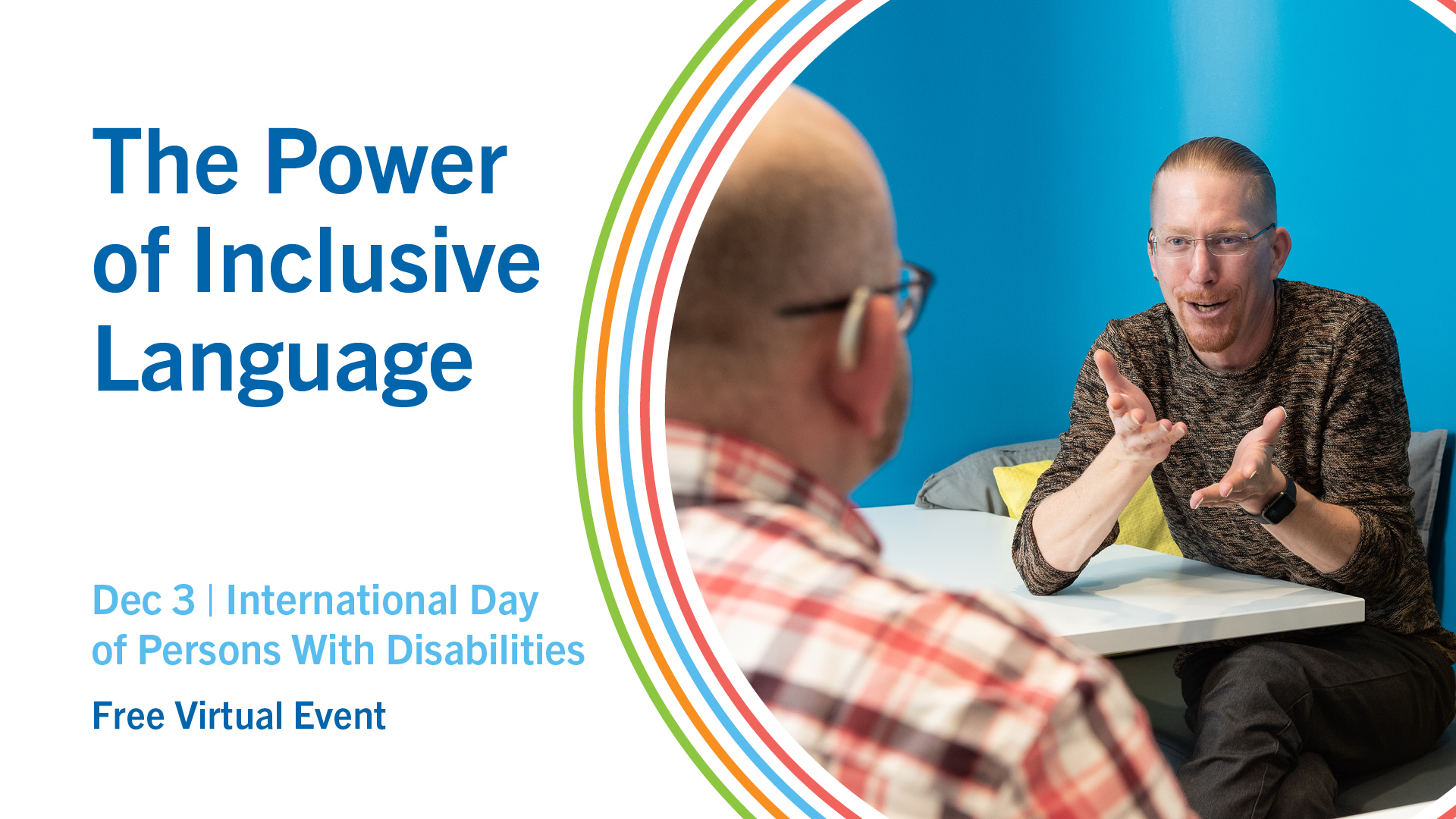
Le français
Les mots qu’on emploie ont à la fois du sens et du poids.
Voilà le thème de notre discussion en direct, Le pouvoir du langage inclusif, qui s’est déroulée le 3 décembre 2021 à l’occasion de la Journée internationale des personnes handicapées. Sont venus d’un bout à l’autre du Canada, un groupe de spécialistes en matière d’accessibilité et d’inclusion qui ont profité de l’occasion pour offrir beaucoup de matière à réflexion au cours de la conversation d’une heure animée par Marco Pasqua, militant des droits des personnes ayant un handicap.
Si vous avez manqué l’événement ou si vous souhaitez en faire part à des collègues, des camarades ou des membres de votre famille, vous pouvez accéder à l’enregistrement ci-dessous.
Le groupe de spécialistes se composait des membres suivants :
- Christine Selinger, conceptrice pédagogique au sein de la Société canadienne du sang, directrice de l’éducation et des événements pour Abilities Expo et experte-conseil indépendante qui conseille sur les solutions en matière d’événements accessibles
- Meghan Kelley, gestionnaire nationale, solutions d’affaires, Conseil canadien de la réadaptation et du travail
- Monica Ackermann, directrice, Centre d’excellence en accessibilité, Banque Scotia
- Wissam Constantin, président, Association des Sourds du Canada
Il y a tant de points de discussion qui traitent du sujet du langage inclusif. Même si cette publication se veut un résumé de l’événement, nous transmettrons par courriel les réponses que nous n’avons pas eu le temps de donner aux trois questions les plus saillantes posées lors de la période de questions.
Les membres du groupe de spécialistes se sont entendus pour dire que le langage inclusif est une question de pleine conscience. Quand nous faisons de notre mieux pour communiquer consciencieusement et de façon intentionnelle, nous faisons la promotion de l’équité et favorisons le progrès social dans l’intérêt des personnes ayant un handicap. Les membres du groupe de spécialistes se sont par ailleurs entendus pour dire que le langage inclusif ne consiste pas simplement à employer une liste de mots « justes ».
« Une liste de mots ne change absolument rien; c’est plutôt l’attitude qui fera la différence », affirme M. Constantin. « Il peut arriver qu’une personne emploie les bons mots sans pour autant adopter la bonne démarche, le bon ton, voire la bonne attitude. »
Les questions suivantes ont suscité une conversation réfléchie et intéressante :
Que signifie pour vous un langage favorisant l’inclusion des personnes ayant un handicap?
Pour Mme Ackermann, un langage qui favorise l’inclusion des personnes ayant un handicap reconnaît que le handicap concerne l’expérience vécue d’une personne et qui doit ainsi être traitée en conséquence. Il ne s’agit pas non plus de dépeindre les personnes ayant un handicap en tant qu’héroïnes dignes d’admiration, ou bien, en tant que victimes dignes de pitié.
« Pour moi, un langage qui favorise l’inclusion des personnes ayant un handicap consiste principalement à mettre la personne au premier plan, à se centrer sur l’être humain et à reconnaître que le handicap concerne l’expérience vécue d’une personne et fait partie intégrante d’une personne avec son identité », souligne Mme Ackermann. « Le langage inclusif va bien au-delà de la phrase utilisée pour décrire un handicap. Le langage perpétue-t-il les préjugés et les stéréotypes? Célèbre-t-il à la fois le l’unicité et la quotidienneté de l’expérience humaine? Ce sont, pour moi, certaines des décisions sur l’inclusion que nous sommes habilités à prendre tous les jours. »
Mme Kelley ajoute que le langage inclusif est une notion nuancée en perpétuel évolution qui reflète les préférences personnelles.
« Le langage évolue avec le temps, et la compréhension actuelle que nous en avons et le contexte dans lequel il se situe changeront au fur et à mesure que nous apprendrons et progresserons », dit-elle. « Il faut respecter les autres personnes qui nous entourent et le choix en termes de langage quand il est question d’identité. »
Cela consiste aussi à se montrer compréhensif à l’égard de la préférence pour un langage qui parle de la personne d’abord, ce qui attache plus d’importance à la personne qu’à son diagnostic, ou encore un langage qui parle de l’identité d’abord, ce qui désigne un langage qui commence par le handicap d’une personne, note Mme Selinger.
« Je m’identifie comme une personne handicapée, en parlant d’abord et avant tout de mon handicap, car j’utilise un fauteuil roulant. Pour moi, l’emploi universel d’un langage inclusif est un geste aussi bien réfléchi qu’intentionnel », affirme-t-elle. « Je sais qu’il est difficile de changer son langage. Il arrive que des choses vous sortent de la bouche avant que vous vous rendiez compte de ce que vous avez dit – j’en suis bel et bien coupable! Nous ne nous sommes pas réunis aujourd’hui pour vous dire que ce que vous faites n’est pas la bonne façon de procéder ou que vous êtes une méchante personne si vous employez un certain langage. Nous sommes ici pour vous sensibiliser aux impacts du langage. »
Quels sont quelques-uns des facteurs à envisager à l’égard de la communication inclusive dans une optique multi-handicap?
Selon Mme Selinger, il est essentiel de prendre en considération la population globale au moment d’envisager le langage inclusif.
« Quand nous réfléchissons au langage et aux handicaps, il faut penser en termes autres que les dispositifs d’aide à la mobilité et autres que les personnes qui utilisent un fauteuil roulant. Les handicaps ne se répartissent pas en segments. Ainsi, nous ne pouvons pas simplement réfléchir à un handicap à l’exclusion des autres. »
Comme le souligne Mme Kelley, les méthodes de communication ont évolué au cours des 18 derniers mois. Les restrictions sanitaires découlant de la pandémie de COVID-19 ont eu pour effet de faire des réunions virtuelles la nouvelle normalité au bureau. Il appartient aux organismes et aux prestataires de services de savoir repérer les lacunes au niveau de l’accessibilité et de proposer des solutions dans le domaine numérique, ajoute Mme Kelley.
M. Constantin insiste sur le fait que l’emploi d’un langage qui favorise l’inclusion des personnes ayant un handicap relève de la préférence de chacune et de chacun et qu’il existe un éventail de préférences chez les personnes ayant un même handicap, par exemple.
« Prenons mon handicap à titre d’exemple. Au sein de la communauté S/sourde, on observe une variété de préférences : il y a des gens qui préfèrent communiquer par la lecture labiale, des gens qui préfèrent communiquer par le langage gestuel ou encore par la lecture ou par l’écriture, et des gens qui préfèrent recourir aux services d’un interprète », affirme-t-il. « Si vous avez connu une expérience avec une personne ayant un handicap, cela ne veut pas forcément dire que toutes les personnes ayant un handicap ressembleront à cette personne. »
Vous est-il déjà arrivé de communiquer par un langage inclusif; si oui, quel a été l’impact sur vous?
Mme Ackermann, qui reconnaît le fait qu’elle parle du point de vue d’une alliée, affirme qu’il est encourageant de voir d’autres personnes intégrer dans leur vocabulaire un langage qui favorise l’inclusion des personnes ayant un handicap, car il contribue grandement à un virage culturel.
Mme Selinger cite deux exemples à l’appui de l’assertion de Mme Ackermann. Elle a l’habitude de prendre des organismes au dépourvu lorsqu’elle les téléphone à l’avance pour s’informer sur l’accessibilité dans leurs bâtiments. Il lui est arrivé une fois d’appeler une brasserie où l’employé a énuméré une liste de caractéristiques importantes favorisant l’accessibilité.
« Je n’étais pas du tout prête à parler à quelqu’un d’autre qui, lui, était prêt à répondre à la question! », s’exclame Mme Selinger. « Alors, aux personnes qui dirigent une entreprise, soyez prêts à répondre aux questions. C’était merveilleux de constater que cet établissement était déjà au courant des choses qui devaient être accessibles. »
Elle se rappelle une autre situation, lors d’un service funéraire, où la personne célébrante a demandé aux invités de se lever si elles et ils en étaient capables. « Cette demande a eu un très grand impact, car elle m’incluait », ajoute Mme Selinger. « Il y a un tas de petits gestes que l’on peut poser pour intégrer le handicap dans son langage de tous les jours. »
Comment agir pour militer en faveur de l’emploi d’un langage inclusif en milieu de travail?
Il est d’une importance capitale que tous et toutes – les personnes ayant et n’ayant pas un handicap – apprennent les uns des autres, selon M. Constantin.
« J’ai entendu dire que les personnes ayant un handicap ne sont pas nées pour vivre; elles sont plutôt nées pour devenir militantes. Je trouve cela absolument malheureux, mais en même temps, vrai, car nous consacrons tellement d’énergie à instruire le public sur ce en quoi consistent nos besoins », explique-t-il.
« Les personnes en position d’autorité en milieu de travail doivent reconnaître la nécessité de demander aux personnes ayant un handicap de préciser de quelles adaptations elles ont besoin. Il est par ailleurs nécessaire pour une personne ayant un handicap de prendre l’initiative pour indiquer de quelles adaptations elles ont besoin. Je crois qu’en travaillant ensemble, nous pourrons faire du monde un meilleur endroit où vivre. »
Les employeurs peuvent aussi prêcher d’exemple en créant des occasions de dialogue et de sensibilisation, souligne Mme Kelley. Il est aussi important d’être conscient des perspectives fondées sur le capacitisme, ajoute Mme Ackermann.
« Alors, il m’arrive souvent d’entendre dire que l’employée ou l’employé ayant un handicap a de la difficulté à rester à la hauteur des exigences de ses fonctions au niveau de la productivité. Voilà un bel exemple qui reflète une perspective fondée sur le capacitisme. Ce n’est pas le handicap qui est à l’origine de la difficulté, si on peut l’appeler ainsi », poursuit Mme Ackermann. « Ce sont plutôt les obstacles à l’accessibilité en milieu de travail. Nous devons vraiment prendre conscience de la façon dont nous formulons ces conversations, au cours desquelles j’entends trop souvent l’emploi des mots “enjeu”, “problème”, “préoccupation” dans les mêmes phrases où est utilisé le terme “handicap”. Je ne crois pas que cela se fasse avec malice ou de façon intentionnelle, ou encore, pour faire du mal, mais, en réalité, cela fait du mal. »
Mot de la fin au sujet du pouvoir du langage inclusif
Mme Kelley : « Le dernier énoncé dont je souhaite surtout faire part aux participantes et participants à cet événement est celui qui porte sur l’importance du choix lorsqu’il est question de langage. Il nous arrive souvent de demander à des personnes de s’identifier ou de parler de leur identité, au lieu de leur demander de venir telles qu’elles sont. »
Mme Ackermann : « Nous avons peut-être un objectif en commun, mais nos façons de l’aborder diffèrent considérablement. Je crois que nous devons saisir toutes les occasions qui s’offrent à nous pour entamer ce dialogue dans l’optique d’enrichir notre communauté et nos conversations. »
Mme Selinger : « Lorsqu’il est question de langage, d’étiquette, et de tout ce qui entoure le handicap, les personnes à écouter sont celles ayant un handicap. Il n’existe pas d’approche universelle. Quand vous parlez à des personnes, assurez-vous de vous informer sur leurs préférences. »
M. Constantin : « Je fais des pressions auprès d’entreprises pour qu’elles embauchent et rémunèrent des interprètes. Je pose la question suivante aux entreprises qui se montrent parfois peu disposées à payer les services d’interprètes : est-ce que vous forcez les personnes qui utilisent un fauteuil roulant à payer l’achat d’une rampe d’accès pour fauteuils roulants? Je tiens tout simplement à avertir les entreprises qu’il leur incombe d’assurer l’accès et que cela ne relève pas de notre responsabilité. Il n’y a pas de mal à demander. En général, les gens ne s’offusqueront pas si vous leur demandez de quoi ils ont besoin. »
Ce fut un honneur pour la Fondation Rick Hansen d’avoir animé cette incroyable conversation à l’occasion de la Journée internationale des personnes handicapées; nous sommes d’ailleurs ravis de pouvoir la reprendre lors de futures conversations. Nous remercions sincèrement les membres estimées et estimé de notre jury de nous avoir fait part de leurs expériences et de leurs réflexions, de même que les nombreuses personnes qui ont participé à la conversation. Ce n’est qu’en travaillant ensemble que nous pourrons créer une société inclusive où les personnes, quelles que soient leurs capacités, sont considérées comme des êtres dotés de droits égaux et qu’elles ont l’occasion de profiter pleinement de la vie.
Parce que, comme l’a souligné M. Constantin :
« Le handicap en soi est souvent mal formulé; on le perçoit comme ce qu’une personne n’est pas capable de faire. Et je tiens à mentionner que chaque personne a sa façon à elle de procéder. Et c’est tout. C’est tout simplement une optique différente, une façon différente d’être. Il n’y a pas de façon d’être qui soit meilleure qu’une autre. Ce n’est qu’une façon différente de procéder. »
